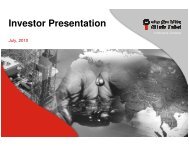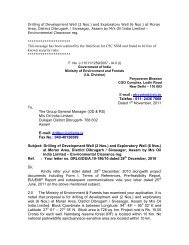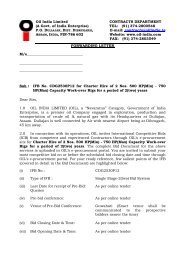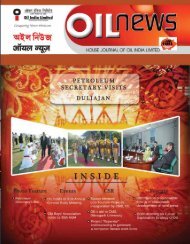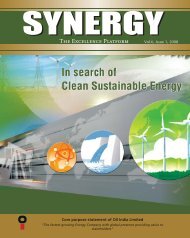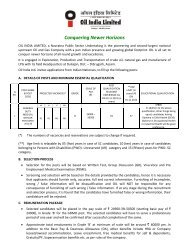Vol. 35 No. 8. May - Jun 2006 - Oil India Limited
Vol. 35 No. 8. May - Jun 2006 - Oil India Limited
Vol. 35 No. 8. May - Jun 2006 - Oil India Limited
Create successful ePaper yourself
Turn your PDF publications into a flip-book with our unique Google optimized e-Paper software.
A<br />
LEADERSHIP & EMOTIONAL INTELLIGENCE<br />
<strong>No</strong> creature can fly with just one wing. Gifted leadership occurs where heart and head---feelings and thought---meet.<br />
These are the two wings that allow a leader to soar.<br />
— Daniel Goleman<br />
s we in <strong>Oil</strong> <strong>India</strong> move from function based structure to<br />
team based working, the role of the team leaders assume<br />
great significance. There is a growing realization that it is<br />
not just a matter of leaders in formal positions but also the<br />
fact that leaders at all levels have an important role to play<br />
to bring about sustainable deep change in the organization.<br />
All great leaders stand for something. They have defined<br />
some value, issue, or purpose to be of overriding importance<br />
to them. For Martin Luther King, Jr., it was freedom and<br />
civil rights. For John F. Kennedy, it was democracy and<br />
America's destiny. For our father of the nation, Mahatma<br />
Gandhi, it was freedom of <strong>India</strong>. For Lee Iacocca, it was<br />
the survival and prosperity of Chrysler and perhaps the U.S.<br />
auto industry as a whole. Each of these men embodied a<br />
strong commitment to his vision. His life spirit was involved<br />
in it. Because of their commitment, others were willing to<br />
commit themselves under the leadership of these men.<br />
Such leaders know that what people value most deeply will<br />
move them powerfully in their work. That strong sense of<br />
collective mission comes from emotional intelligence which<br />
sets the best leaders apart from the rest - not just in<br />
tangibles such as better business results and the retention<br />
of talent but also in the all-important intangibles, such as<br />
higher morale, motivation and commitment.<br />
Emotional intelligence is the sine qua non of leadership.<br />
Without it a person can have best training in the world, an<br />
incisive, analytical mind, and an endless supply of smart<br />
ideas, but he still won't make a great leader. It is a metaability<br />
which determines how well we can use whatever<br />
other skills we have, including raw intellect. People who<br />
are emotionally adept - who know and manage their own<br />
feelings well, and who read and deal effectively with other<br />
people's feelings - are at an advantage in any domain of<br />
life, whether romance or intimate relationships or picking<br />
up the unspoken rules that govern success in<br />
organizational politics.<br />
Emotionally intelligent leaders are attuned to their inner<br />
signals, recognizing how their feelings affect them and their<br />
job performance. They can often intuit the best course of<br />
action, seeing the big picture in a complex situation. They<br />
get the focused drive to achieve their goals by staying<br />
optimistic and upbeat, even under intense pressure and<br />
thereby radiating positive feelings that create an<br />
environment of trust, comfort and fairness. Those who cannot<br />
marshal some control over their emotional life fight inner<br />
battles that sabotage their ability for focused work and clear<br />
thought.<br />
Knowing that nothing important gets done alone,<br />
emotionally intelligent leaders have a network in place. And<br />
in an era when more and more work is done long distance<br />
- by e-mail or by phone - relationship building, paradoxically,<br />
becomes more crucial than ever before. Relationship<br />
Management is not just a matter of friendliness, rather it is<br />
friendliness with a purpose: moving people in the right<br />
direction.<br />
As the task of leadership is becoming more complex and<br />
collaborative, relationship skill is becoming increasingly<br />
pivotal. In many large successful organizations, more and<br />
more leaders are routinely working with their peers as part<br />
of cross-functional teams. And that means establishing<br />
close and smooth relations so that everyone can share<br />
information easily and coordinate effectively. When it comes<br />
to getting results, the emotionally intelligent leaders act<br />
according to one or more of six distinct approaches to<br />
leadership and skillfully switch between the various styles<br />
depending on the situation.<br />
Four of these styles - visionary, coaching, affiliative and<br />
democratic - create the kind of resonance that boosts<br />
performance, while two others - pacesetting and<br />
commanding - although useful in some very specific<br />
situations, requires to be applied with caution. A research<br />
on 3871 executives world-over has shown that other things<br />
being equal, leaders who used styles with a positive<br />
emotional impact saw decidedly better financial returns than<br />
those who did not. It also showed that leaders with the best<br />
results did not practice just one particular style. Rather on<br />
any given day or week, they used many of the six distinct<br />
styles seamlessly and in different measures depending on<br />
the business situation.<br />
To help leaders of the different intact teams of OIL to<br />
enhance the leadership qualities, programs on "Leadership<br />
self Development" are being conducted as part of the BP<br />
initiative. The target group of executives is all the Intact<br />
Team Leaders and also other executives in grades 'E' to<br />
'G'. The main objective of these programs is that participants<br />
learn new skills about how to work in teams and also how<br />
to lead multifunctional teams more effectively.<br />
Two programs have already been conducted successfully<br />
and feedbacks received from the participants have been<br />
encouraging. There has been appreciation about the<br />
importance of emotional intelligence for a leader to be<br />
effective. While talking about their individual leadership<br />
styles, participants expressed that most of them have been<br />
practicing the 'pacesetting style' and 'commanding style',<br />
which are essentially dissonant styles. After going through<br />
this program they felt that they would like to make a shift<br />
from dissonant styles to resonant styles - visionary,<br />
coaching, affiliative and democratic.<br />
The good news is that leadership is learnable. The process<br />
is not easy. It takes time and commitment. But the benefits<br />
that flow from leadership with well-developed emotional<br />
intelligence, both for the individual and the organization,<br />
make it not only worthwhile but invigorating.<br />
— B.P. Team<br />
Organisational Transformation<br />
3



